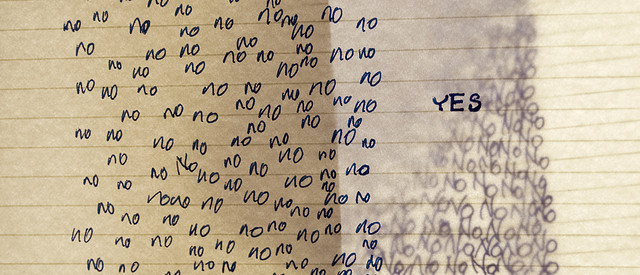I used to be a “no” person.
Everything that was put to me, I always had a reason to say no. Even when I wanted to say yes sometimes I said no.
Saying no seems to give us a sense of control or power over a situation. It makes us comfortable. It’s not necessarily rude, but our bodies natural reaction to change.
Think about a situation where you’re asked: “Can you get that to me by 5?”
No, and here are all the reasons why:
My dog ate my computer whilst we were on the way to the vet because he hasn’t been feeling well and his hip is playing up, not to mention his dodgy ear and my grandma asked me to drive her to the store because the bus broke down.
Elaborate lies or real excuses, our natural defensive mechanism comes into play in situations where we may not really want to do something or feel it could be hard work from our end. Regardless, many of us get the guilts and turn around and do it anyway.
Why do we get the no’s? This situation can happen in everyday things, like going out for a coffee, to the gym, when we might just think we are too busy or just catching up with family members when all we want to do is sit on the couch watching a Friends marathon on a Sunday afternoon.
Merriam Webster dictionary defines the word no as “used to give a negative answer or reply to a question, request or offer.” This negativity has the potential to cause damage we might not be aware of.
No isn’t always a dirty word, but when used too often it can change people’s perceptions of us.
In her New York Times best seller Better than Before, author Gretchen Rubin explains the term “demand resistant” as people who have a negative response to pressure, obligations or expectations. And for people with a strong will, like myself, the immediate reaction to being told we “should do” something is a complete shutdown—even if we don’t actually agree with saying no. No one likes being told no all the time. People will eventually stop asking, but their opinion of us can change in a negative way.
But I pose the question: What if we said yes? Not to one situation, but to many and as often as possible.
Imagine how it would change other’s perceptions of us? How often do we hear the phrase “That person is really annoying just saying yes all the time?” I doubt it’s ever.
Dr. Ron Alexander, psychotherapist and author of Wise Mind, Open Mind, talks about how being in a “yes state” is having an open mind, a state of open possibilities. Think about it: when we are open to trying new things our body isn’t tense. We may feel vulnerable, but our body is not in a state of tension. The word no can make us feel uneasy, right down to clenching our jaws.
This year I practiced the art of saying yes. Practice, because it’s not easy. And it’s not easy because I’m bloody exhausted.
As I was working through my own quest for a happier state of mind, I realized that people either at work or in personal life had told me I shut things down by saying no before I even think about the right answer. I’m stubborn as hell and certainly guilty of thinking things are either too hard sometimes or getting stuck in the old “but we’ve always done it this way” type of thinking. So I decided to change those negative reactions and actively go against everything I felt my body wanted to do or feel. I decided to just say the word yes and see how I might feel or be perceived.
I’ve said yes to extra work, which has turned into more opportunity. I’ve said yes to fun activities like concerts, nights out, road trips and dinners with friends. In turn, I have no money—which for many is a huge restriction—but I’ve had such a fantastic time in everything I’ve agreed to.
Ultimately, I’m the happiest I’ve ever been in my life and I believe saying yes has been a huge factor in this. I’ve allowed myself to feel open to new ways of thinking and new opportunities.
I’m still unsure why we like the control of saying no. Maybe our mind likes to create road blocks for things that seem too hard or out of order with what we thought our day would look like. Our maybe we just really overthink things.
But what if we pushed past that comfort zone a little more and realized how wonderful it could be to just say yes? You might find your colleagues love working with you because you’re easier to work with. You may build on great friendships and make new ones along the way.
Whatever it might be, I urge you all to practice the art of saying yes more often and watch your life change in an incredibly positive way.
Relephant Read:
How to say yes & Mean It.
Author: Krystal Sanders
Assistant Editor: Lindsay Carricarte/Editor: Nicole Cameron
Image: Flickr/Abhi











Read 0 comments and reply